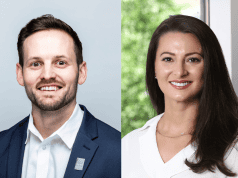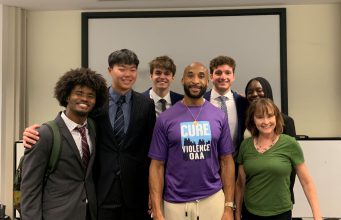
Recently, future Evening MBA students participated in a unique experience at Goizueta.
Students interested in Goizueta’s Evening MBA program were invited to come and hear Senior Lecturer in Organization & Management and Distinguished Lecturer in Entrepreneurship Charlie Goetz as well as alum Sherezad Rehmann 15EvMBA speak during a fireside chat.
The two became fast friends during Rehmann’s time at Goizueta, having long conversations over coffee about politics, entrepreneurship endeavors, academics and more. Even after Rehmann’s graduation, the two have remained close friends. The evening shined a light on what networking opportunities and relationships could be for future students at Goizueta.
Kathleen Edwards with Evening MBA admissions moderated the chat.
Edwards: Charlie, what courses are you teaching this semester?
Goetz: I teach Intro to Entrepreneurship. We help you develop a product idea, and you learn how to create a business plan and how to make the investment. You get an opportunity in front of a hundred different investors. I have an applied class where we give you a business plan, and you compete against other teams to build this business. We teach you how to market, how to sell, how to grow your business rapidly and how to sell the business for a lot more than your finance professors would tell you it’s worth.
Rehmann: When you come to Goizueta, you’ll have different types of professors. You have some who go really deep in a specific area and you have others who have been out in the world, have built businesses, sold them and understand how business is actually done. Professors like Charlie teach you marketing and business development strategies that you can employ the next day.
Edwards: Did you first meet when you took Intro to Entrepreneurship or did you seek Charlie out?
Rehmann: I sent him an email. We met at a Starbucks and sat for two hours talking business, talking ideas. He wasn’t my professor at the time. It was my first semester. He was the entrepreneurship professor, and I was thinking about some business ideas. I reached out. I planted the seed that day for my directed study in Brazil and then vetted the project out a little more. We sat down a couple times, had a phone call or two.
Goetz: You did it earlier than most people do. Most people are here a year or so.
Rehmann: When I came back from Brazil, I became his TA. You don’t do it for the money. It’s the relationship. It’s the insights you gain from other students in class. Everyone does their business plan or tries to start a business in the class, and you get to see what’s on everyone’s mind. For me, it was an invaluable experience.
Edwards: How do students make the most of their experience?
Goetz: Participate. Obviously, we have students of all types, but I find the students who participate enjoy it more, do better at it, get more out of it. It’s your responsibility to make it that way. All the opportunity is there for you. You just have to ask.
Rehmann: Some people get their MBA to check the box. I didn’t. At Goizueta, it is the people. It’s the other students, and you won’t come out with 100 new best friends. It’ll be three, four solid relationships that you stay up with post-grad. And, you’ll have that network of 100, or however big your class is, but you got to keep those quality three to five when you leave. And then a professor or two.
Edwards: Charlie, how do you maintain that small class “feel” and connect with your students when you have a full classroom?
Goetz: Classes aren’t all that big. When they’re full, there are 65 students, and five to 10 who really want to spend extra time with the professor.
Rehmann: Students are nervous, but just go up there and shake a hand. You just got to push yourself a little. And when you leave class, you walk from here to Fishburne Parking Deck. Some students walk back with the same person every day. Some decide to try, at least once a week, to walk back with a different student. You have mini conversations. If you push yourself, some really cool things start to happen.
Edwards: How do you handle work-life balance? How do you approach it?
Rehmann: For the evening MBA, you find your rhythm. It’s a marathon, two and a half to three years. You can’t sprint your way through it. You’ve got to find a consistent rhythm that works. You get a little more disciplined. You get smarter about your time. You start to cut some of your bad habits and become smarter about how you spend your time.
Edwards: Any last thoughts?
Rehmann: One of the most valuable skills is emotional intelligence. You’ll learn all the hard skills here, but it’s the soft skills you have to kind of develop yourselves. The best professionals, they have those soft skills — looking people in the eye, shaking hands, empathy, understanding conflicting points of view, small talk, building relationships and gaining trust. These things are difficult to teach in a classroom but are critical. It comes down to walking from here to Fishburne. So, after class, force yourself to have that conversation.











